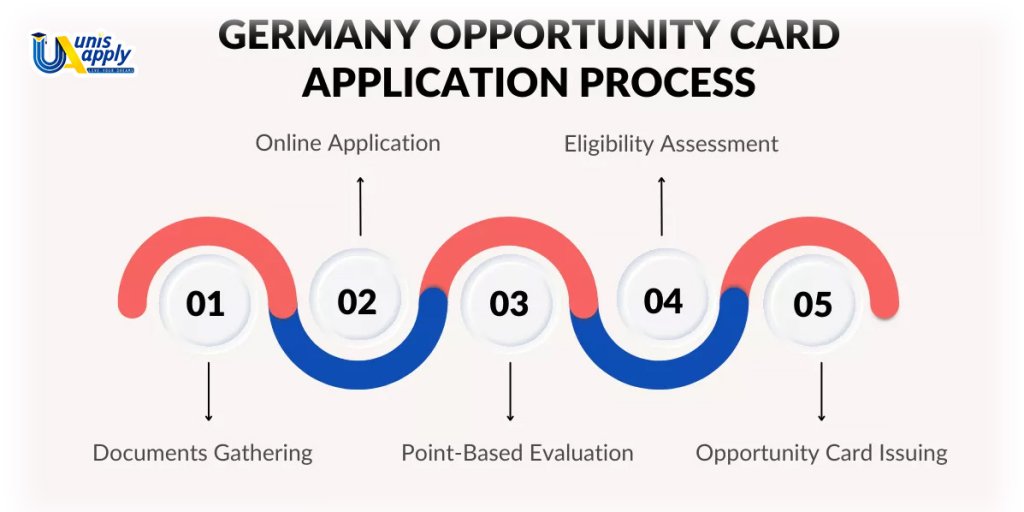Chancenkarte Deutschland / Opportunity Card Germany
Introducing Germany's Opportunity Card!
In the past, if you were from a non-EU country and wanted to work in Germany, you had to jump through hoops. You either needed a solid job offer or had to prove you were highly skilled. This made it tough for qualified folks from abroad to come and work here.
But now, there’s a game-changer – the Opportunity Card! It’s here to make things easier for you. With this card, non-EU applicants get a whole year to look for a job in Germany. That means you can explore opportunities and find the right fit without rushing.
Getting the Opportunity Card is simple. You can apply at two places: either at the Foreigners’ Registration Office in Germany or at the German Embassy in your home country. So, no matter where you are, there’s a way to kickstart your journey to work in Germany!
It’s a win-win situation – Germany gets access to talented individuals from around the world, and you get a chance to pursue your career dreams in this amazing country. So, if you’re ready to take the next step in your career, grab your Opportunity Card and get set to explore job opportunities in Germany
With this Card, international workers can thrive in a dynamic work setting, enjoy a high quality of life, and pursue promising career paths in one of Europe’s leading economies.
• Duration of Stay: Opportunity Card allows you to stay in Germany for a period of 1 year which can be further extended to 3 years.
• Germany Job Seeker Visa: Grants a 6-month stay for job seekers.
• Point-Based System: The Opportunity Card operates on a point-based system to determine applicant eligibility.
• Point Requirement: To qualify for the Germany Opportunity Card visa, you need to accumulate only 6 points out of the total 14 available points.
• Work During Job Search: With the Opportunity Card, you are permitted to work in Germany (2-week trail jobs) while you are actively searching for a job
• Part-Time Employment: The Opportunity Card also allows you to engage in part-time jobs (20 hours per week) during your job-seeking period.
• Language Requirement: Although optional for the Opportunity Card application, demonstrating at least A1 in German or B2 in English offers flexibility for applicants with skills in either language.
Eligibility Criteria of the German Opportunity Card
Candidates who wish to apply for the Chance Card Germany application process must meet specific eligibility criteria, detailed on the Germany Opportunity Card official website.
These criteria are essential for ensuring that individuals are eligible to avail themselves of the benefits the card offers.
• Applicants must be a Non-Europian.
• Minimum of 6 Germany Opportunity Card Points
• Applicants must be 35 years old or younger at the time of applying.
• Language Proficiency
• Prior residency in Germany (optional)
• 3 years of professional work experience
• No criminal record is mandatory.
• Demonstrating adequate financial means to sustain oneself in Germany
• Applications must be submitted through the German Embassy.
Point-Based System for the German Opportunity Card
The German Opportunity Card operates on a point-based system. Points are awarded based on factors such as education, work experience, language skills (English and German), and age. Applicants who score Germany opportunity card points above a certain threshold of 6 points are considered eligible for the card. This system ensures that the most qualified and suitable candidates are selected.
Point-Based System for the German Opportunity Card
| Qualification (Degree) | |
|---|---|
| Qualification (Degree) | Up to 6 points if you hold a university degree. |
| Experience | Up to 3 points based on relevant work experience. |
| Age | 2 points if under 35, or 1 point if between 35 and 40 years old. |
| German Language | Up to 3 points based on proficiency in German. |
| Previous stays in Germany | 1 point if you have lived in Germany for at least 6 months. |
Advantages of ChancenKarte
• FAST ENTRY INTO GERMANY
• CHANCE OF PERMANENT RESIDENCE
• GOOD INCOME
• GUARANTEED WORK PERMIT
• POSSIBILITY FOR FULL-TIME WORK
The Federal Government of Germany is making it easier for prospective workers from non-EU countries to enter with the introduction of the new Opportunity Card. To qualify for this card, you only need to demonstrate that you have completed at least two years of vocational training or obtained a university degree. Additionally, you should have basic knowledge of either German (A1 level) or English (B2 level). You’ll also need to support yourself financially during your stay in Germany.
If you meet these basic criteria, you can use a points system to assess your qualifications further. To be eligible to work in Germany, you must score a minimum of six points. This system helps ensure that applicants have the necessary skills and qualifications to contribute effectively to the German workforce. So, if you fulfill these requirements, you’re on your way to seizing the opportunity to work in Germany!

Key advantages of the Opportunity Card
1. Easy and Swift Entry to Germany
Getting into Germany is now hassle-free with the Opportunity Card. You don’t need to secure a permanent job contract beforehand. Instead, you can showcase your qualifications using the points system, which includes things like language proficiency and work experience. This simplifies the process, doing away with complex examinations.
Once you have the Opportunity Card, you’re granted a one-year stay in Germany to hunt for the right job. You can even take up part-time or casual work for up to 20 hours a week, or try out a two-week trial job. This flexibility allows you to take your time, explore different opportunities, and find a job that matches your skills and preferences.
So, with the Opportunity Card, you can settle into Germany at your own pace, get to know potential employers, and land a job that’s just right for you.
2. Potential for Permanent Residence in Germany
While the Opportunity Card initially grants a one-year residence permit for job hunting purposes, there’s a pathway to permanent residency in Germany. During this year, you can explore unlimited trial jobs and work part-time for up to 20 hours per week, with the flexibility to divide your hours as needed.
Once you’ve secured a suitable job, extending your stay is possible. You’ll need to apply for an extension through the appropriate Foreigners’ Registration Office. Transitioning from part-time to full-time employment significantly improves your chances of obtaining a longer residence permit. Even if you prefer to remain in part-time work, you can still pursue an extension.
To support your extension application, it’s crucial to provide written evidence such as an employment agreement or a permanent job contract. This documentation demonstrates your commitment to contributing to the German workforce, making it easier to secure a longer stay in the country.
3. Ensuring Financial Stability with a Decent Income
With the Opportunity Card, you have the opportunity to secure your livelihood through part-time employment, provided it meets or exceeds the minimum wage. As of May 2023, this stands at 12.00 euros gross per hour. Working part-time for 20 hours a week can yield a monthly income of over 1000 euros.
Transitioning to a full-time job will significantly increase your net income, well surpassing the 1000 euros per month mark. Your earning potential will vary depending on the industry you’re employed in and your qualifications. However, with the Opportunity Card, you stand a good chance of earning a fair wage, enabling you to comfortably finance your everyday expenses in Germany. So, you can focus on building your life and pursuing your goals in this vibrant country.
4. Guarantying Your Work Permit:
Previously, workers from non-EU countries needed a visa to enter and work in Germany, often contingent upon having a job offer approved by the Federal Employment Agency. However, with the Opportunity Card, there’s a guaranteed pathway. Even if you’re not recognized as a skilled worker, you can come to Germany to seek employment locally.
To qualify for the Opportunity Card, you need to meet some basic requirements. This includes having completed at least two years of vocational training or obtaining a university degree as per the standards of your home country. Additionally, you must demonstrate basic proficiency in either German (A1 level) or English (B2 level). Financial independence is also crucial, which can typically be achieved through part-time employment (up to 20 hours per week).
So, with the Opportunity Card, you have a streamlined process to secure your work permit and explore job opportunities in Germany, even without a prior job offer.
5. Opportunity for Quality Part-time/Full-time Employment:
With the Opportunity Card, you can explore various job opportunities, including two-week trial work (unlimited times) or part-time positions of up to 20 hours per week. If you find a suitable job during your stay, you have the potential for a qualified part-time or full-time position.
However, if you aim for a full-time job in the future, you’ll need to update your residence status. The Opportunity Card solely permits job-seeking in Germany. To extend your stay for employment purposes, you’ll need to apply for the appropriate residence title at your local Foreigners’ Registration Office.
This transition should be smooth if you can provide evidence of a future job offer or an employment contract. So, with the Opportunity Card, you have the opportunity to pave your way towards a fulfilling career in Germany, whether part-time or full-time.
Conclusion:
In conclusion, the Opportunity Card offers a convenient and straightforward route for entering Germany and seeking employment. With this card, you’re granted a 12-month residence permit, during which your primary focus is on finding a suitable job. If successful, you have the option to transition to another residence title, potentially extending your stay.
To apply for the Opportunity Card, you can do so at the appropriate mission abroad in your home country or at your local Foreigners’ Registration Office in Germany. However, it’s essential to meet the basic requirements, including having two years of vocational training or a university degree according to your home country’s standards. There’s no need to have your degree recognized specifically in Germany. Additionally, proficiency in either German (A1 level) or English (B2 level) and financial independence are prerequisites. This can be achieved through part-time employment, which is permitted under the Opportunity Card.
If you meet these basic criteria, you can further demonstrate your qualifications through a points system. Achieving at least six points qualifies you for the Opportunity Card, opening up opportunities for you to explore part-time job options. So, if you’re ready to embark on your journey to work in Germany, the Opportunity Card offers a promising pathway to kickstart your career aspirations.
| Criteria | Description | Points | Language Skills | Proficiency in German or English | - |
|---|---|---|
| A1 level | 1 | |
| A2 level | 2 | |
| B1 level | 3 | |
| B2 level | 4 | |
| Work Experience | Years of relevant work experience | - |
| Less than 1 year | 1 | |
| 1-2 years | 2 | |
| 3-5 years | 3 | |
| More than 5 years | 4 | |
| Age | Age of the applicant | - |
| Under 25 | 2 | |
| 25-35 | 1 | |
| 36-45 | - 0 - | |
| 46 and above | -1 | |
| Ties to Germany | Connections to Germany (e.g., previous stays, family) | - |
| No ties | - 0 - | |
| Some ties | 1 | |
| Strong ties | 2 |
Advantages of ChancenKarte
In conclusion, the Opportunity Card offers a convenient and straightforward route for entering Germany and seeking employment. With this card, you’re granted a 12-month residence permit, during which your primary focus is on finding a suitable job. If successful, you have the option to transition to another residence title, potentially extending your stay.
To apply for the Opportunity Card, you can do so at the appropriate mission abroad in your home country or at your local Foreigners’ Registration Office in Germany. However, it’s essential to meet the basic requirements, including having two years of vocational training or a university degree according to your home country’s standards. There’s no need to have your degree recognized specifically in Germany. Additionally, proficiency in either German (A1 level) or English (B2 level) and financial independence are prerequisites. This can be achieved through part-time employment, which is permitted under the Opportunity Card.
If you meet these basic criteria, you can further demonstrate your qualifications through a points system. Achieving at least six points qualifies you for the Opportunity Card, opening up opportunities for you to explore part-time job options. So, if you’re ready to embark on your journey to work in Germany, the Opportunity Card offers a promising pathway to kickstart your career aspirations.
The Opportunity Card is a valuable document that provides non-EU citizens with a legal residence permit in Germany, specifically designed to facilitate their job search without the need for a fixed employment contract. It offers flexibility by allowing part-time employment of up to 20 hours per week and enables individuals to explore potential job opportunities through two-week trial jobs. Additionally, it offers the possibility of retroactively recognizing vocational qualifications, making it a comprehensive tool for individuals seeking employment in Germany.


